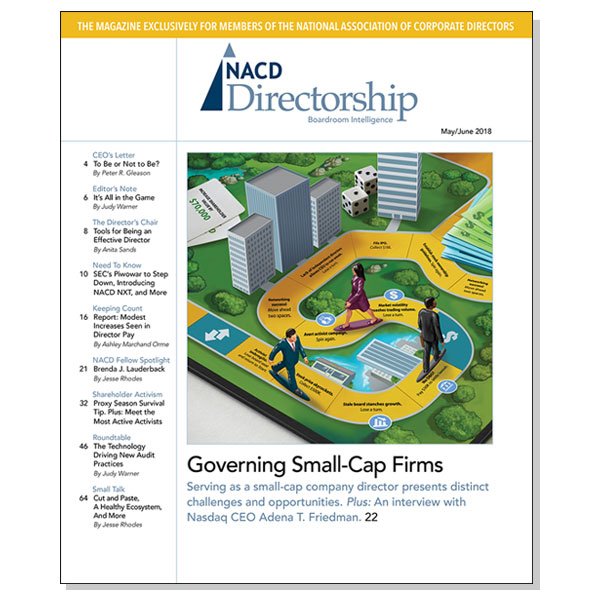The Risks & Rewards of Small-Cap Boardrooms

A former buy-side colleague astutely summed up the difference between the issues of large-cap and small-cap boardrooms recently when he said: “Large-cap governance dialogue is subsumed by issues like executive compensation and proxy advisors, but against that backdrop it’s easy to forget that most public companies—small caps—and their long-biased investors don’t care much about either.” […]
Think Your Website Is Investor Friendly? Not So Fast…

If small-cap companies, and the professional service providers who advise them, comprehended how an institutional investor *actually* reviews corporate websites, websites would look a lot different than they do. I recently had dinner with some former buy-side colleagues. I asked them: “How many of you, in the last couple of months, have ruled out investing […]
Trading Volume: A Primer for Small-Cap Boards

For retail stores, the three things that matter most are location, location, location. In the context of most small-cap stocks, it’s trading volume, trading volume, trading volume. Small-cap boards of directors often make two key mistakes regarding trading volume: (1) they underemphasize its importance; and (2) they rarely monitor it. Why trading volume matters Not only […]
Opening Remarks: SEC Roundtable

I was recently invited to speak at the Securities and Exchange Commission (SEC) Roundtable On Market Structure For Thinly-Traded Securities at the SEC’s headquarters in Washington, D.C. on April 23, 2018. The purpose of the event was to discuss the challenges faced by participants in the market for thinly-traded exchange-listed securities and potential improvements that might […]
The Distinctive Challenges Posed By Small-Cap Shareholder Activists

Directors of small public companies need to be nimble, to do more with decidedly less, and to shepherd companies against long odds for risk-embracing shareholders. The white-knuckle combination of ubiquitous enterprise risks and thin capitalization requires informed, frank, and focused boardroom dialogue, and reacting to shareholder activism is no exception. Since many of the “best […]
Website Bios: What Savvy Investors Are Looking For

I apparently triggered a hot-button topic – yes, website bios – for small-cap CEOs and investor relations professionals in one of my recent webinars (If You Knew How Institutional Investors Actually Assess Websites, Yours Would Look… A Lot Different). Given the number and range of the questions I received, I thought it would be constructive to summarize […]
ESG And Diversity Are Small-Cap Considerations, Too

Environmental, social, and governance (ESG) policies and boardroom diversity have historically been concerns for mid- and large-cap institutional investors. But small-caps should consider embracing both, because this type of investor focus is coming to the small-cap ecosystem, and it also happens to be good business. ESG Is About Scale ESG factors are essentially a continuum […]
Why Small-Cap Boards Should Adopt Stock Ownership Guidelines

The vast majority of large, public companies have stock ownership guidelines (SOGs) that require non-employee board members to attain a certain level of stock ownership within a defined time period and maintain that ownership over the course of their tenures. The number of smaller public companies with SOGs for directors is comparatively small, but growing […]
5 Examples of Outside-the-Box Small-Cap Governance

According to Activist Insights, 65 percent of shareholder activist campaigns in 2017 were waged against small-cap companies, and a majority of those situations arose due to perceived oversight inadequacies. But it’s not all doom and gloom in small-cap boardrooms – quite the contrary. Scores of small public companies continue to prosper against all odds by doing more […]
For Smart Micro-Caps, Financings Don’t End When the Money is in the Bank

According to Nasdaq, 45 percent of its companies have market capitalizations below $300 million. For these micro-cap companies, frequent financing is a fact of life. Given how important financings are to these companies, their officers and directors must be focused on the relevant matters at hand from the beginning of a financing to the end. […]
